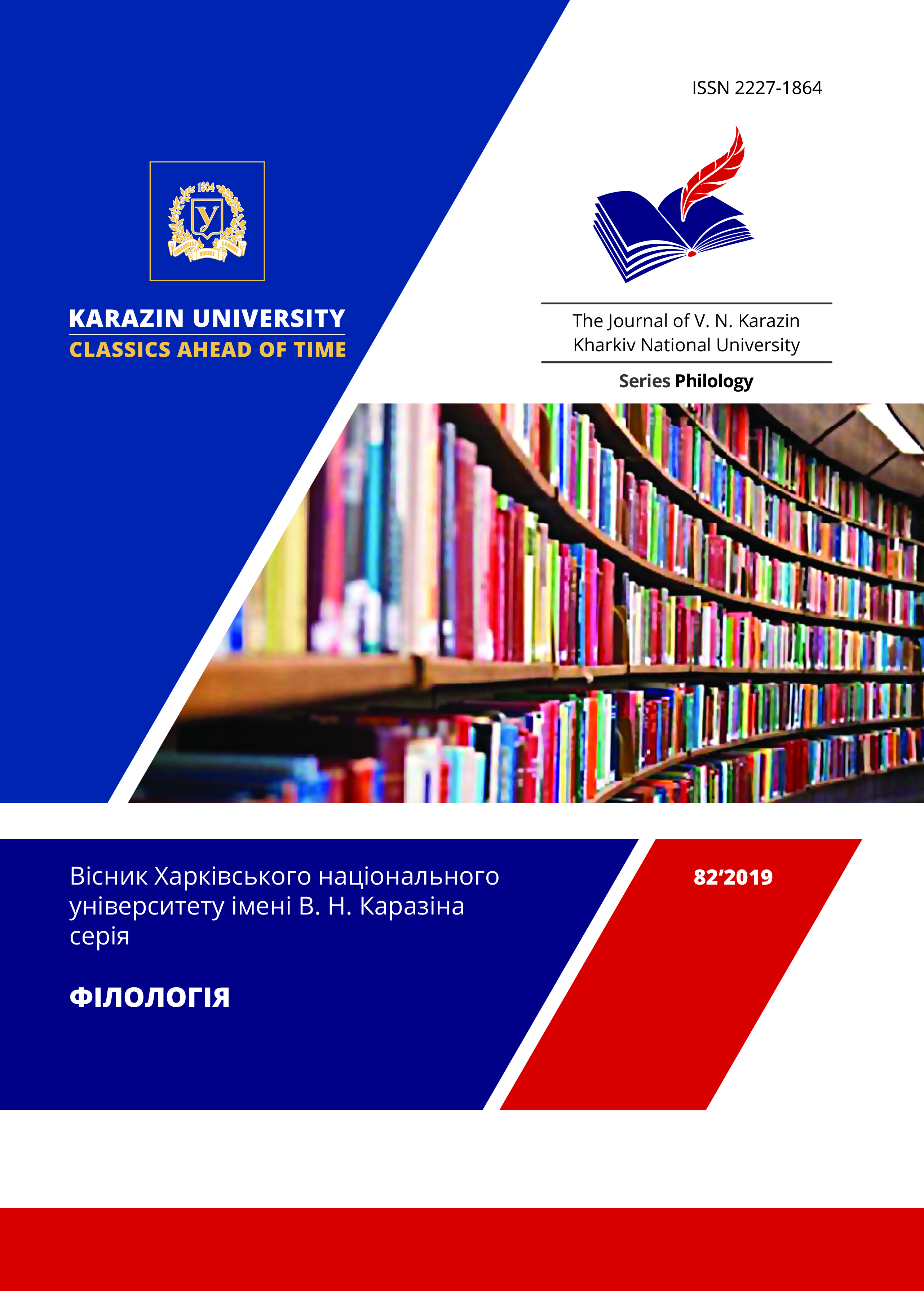Leonid Andreev’s Metaprose: Poetics and Conceptual Basis
Abstract
The article proposes a typology of metatexts by Leonid Andreev, summarizes the study of his feuilletons, letters, diaries and fiction of the 1890-1900s. With this in mind, the specifics of the poetics and the conceptual basis of the metatexts of the writer of the 1910s - Letters About the Theater in the context of his dramas, “panpsychic dramas”, “one-act little comedies”, short stories of the 1910s and the final myth novel The Diary of Satan are characterized. An important genre-forming and conceptual role of artistic imagery in the Letters on the Theater (intertextuality, metaphors, irony, paradox, etc.), characteristic of his prose and dramaturgy of this period, is shown.
It is revealed that the metaphors in Letters on the Theater sought to fulfill the functions of concepts, but being artistic images at the same time, they were characterized by semantic ambiguity, which created an opportunity for different interpretations of what was said. Therefore, the interpretation of the “panpsychic “panpsychic theory in the Letters on the Theater is still ambiguous. In turn, the artworks of the writer of the 1910s were characterized by metatextuality. Andreev’s ironic short stories (Donkeys, Herman and Martha, Cuckolds, Suitcases, etc.), his “one-act little comedies” (Love for the Neighbor, Honor (The Old Count), Beautiful Sabine Women, Horse in the Senate, Monument, etc.) and the myth-novel Satan's Diary are characterized as meta-text, which reflected Andreev’s views on the “old”, Shakespearean, and “new” drama, debates about the creation of which were conducted at the beginning of the twentieth century . In the dramas of the 1910s (Ekaterina Ivanovna, Thought, Samson in Shackles, Requiem, etc.), the theory of the “panpsychic” theater was tested, and concrete forms of the embodiment of the conflict not generated by primary passions (hunger, love, ambition, etc.), but by human thought in its suffering, joy and struggle, were sought.
Downloads
References
Andreev L. N. Dnevnik. 1897–1901 gg. / Podgotovka teksta M. V. Koz'menko i L. V. Khachaturian, sostavlenie, vstup. st. i komment. M. V. Koz'menko. M. : IMLI RAN, 2009. 296 s.
Andreev L. N. S.O.S.: Dnevnik (1914–1919). Pis'ma (1917–1919). Stat'i i interv'iu (1919). Vospominaniia sovremennikov (1918–1919). M., SPb. : Atheneum; Feniks, 1994. 598 s.
Andreev L. N. Sobr. soch. v 6 t. T. 6. M.: Khudozh. lit., 1996. 720 s.
Babicheva Iu. V., Kovalova A. O., Koz'menko M. V. L. N. Andreev i russkii kinematograf 1900–1910-kh godov // Vestnik S.-Peterburgskogo un-ta. Seriia 15. Iskusstvovedenie. 2012. Vyp. 4. S. 149–163.
Bezzubov V. I. Leonid Andreev i MKhT // Uchen. zap. Tart. un-ta. Vyp. 209. Trudy po russkoi i slavianskoi filologii. Tartu, 1968. S. 241–263.
Bulysheva E. V. «Teatr panpsikhizma» L. N. Andreeva: Avtoref. dis. … k.f.n.: 10.01.01. Spb., 2016. 18 s.
Dzhuliani Rita. Leonid Andreev – khudozhnik «panpsikhizma» (Teoriia i praktika litsom k litsu v rasskaze «Bezdna») // Leonid Andreev: Materialy i issledovaniia. M.: Nasledie, 2000. S. 229–237.
Iezuitova L. A. Tvorchestvo Leonida Andreeva (1892–1906). L. : Izd-vo Leningradskogo universiteta, 1976. 239 s.
Isupov K. G. Filosofiia i literatura «serebrianogo veka» (sblizheniia i pe¬rekrestki) // Russkaia literatura rubezha vekov (1890-e – nachalo 1920-kh gg.): V 2-kh kn. Kn.1. M. : Nasledie, 2000. S. 69–131.
Keldysh V. A. Russkii realizm nachala KhKh veka. M., Nauka, 1975. 280 s.
Ken L. N., Rogov L. E. Zhizn' Leonida Andreeva, rasskazannaia im samim i ego sovremennikami. SPb. : OOO «Izdatel'sko-poligraficheskaia kompaniia «KOSTA», 2010. 432 s.
Lakhno E. A. Dramaturgiia budushchego i teoriia «panpsikhizma» L. N. Andreeva // Uchenye zapiski Orlovskogo gos. un-ta. № 1 (64), 2015. S. 162–167.
Literaturnaia entsiklopediia terminov i poniatii. M. : NPK «Intelvak», 2001. 1600 str.
Mikheicheva E. A. O psikhologizme Leonida Andreeva. M.: MPU, 1994. 188 s.
Moskovkina I. I. Mezhdu «pro» i «contra»: koordinaty khudozhestvennogo mira Leonida Andreeva: Monografiia. Khar'kov: KhNU im. V. N. Karazina, 2005. 288 s.
Moskovkina I. I. «Komediiki» L. Andreeva: intertekst i metatekst // Tvorchestvo Leonida Andreeva: sovremennyi vzgliad. Orel, PF «Kartush», 2011. S. 16–22.
Pak San Chzhin. Panpsikhizm v dramaturgii L. N. Andreeva: Avtoref. diss. … k.f.n.: 10.01.01. Spb., 2007. 18 s.
Pis'ma L. N. Andreeva k Vl. I. Nemirovichu-Danchenko i K. S. Stanislavskomu (1913–1917). [Publ. i komment. N. R. Balatovoi i V. I. Bezzubova] // Uchen. zap. Tart. gos. un-ta. Vyp. 266. Trudy russkoi i slavianskoi filologii, XVIII. Literaturovedenie. Tartu, 1971. – S. 231–312.
Rekviem: Sbornik pamiati Leonida Andreeva. – M. : Federatsiia, 1930. 283 s.
Rudnev A. P. Leonid Andreev – publitsist i literaturno-khudozhestvennyi kritik: problematika, stil': Avtoref. diss. … k.f.n.: 10.01.01. M., 1988. 22 s.
Tatarinov A. V. Leonid Andreev // Russkaia literatura rubezha vekov (1890-e – nachalo 1920-kh godov): Kniga 2. IMLI RAN. M. : Nasledie, 2001. S. 286–339.
Teliatnik M. A. Fel'etony L. N. Andreeva v gazete «Kur'er» (1900–1903): spetsifika zhanra, problematika, poetika, stil': Avtoref. dis. … k.f.n.: 10.01.01. SPb., 2012. 24 s.
Chirva Iu. N. O p'esakh Leonida Andreeva // Andreev L. N. Dramaticheskie proizvedeniia: V 2-kh t. L.: Iskusstvo, 1989. T. 2. S. 3–43.
Shishkina L. I. Leonid Andreev i kino: v poiske novoi estetiki // Trudy Sankt-Peterburgskogo gosudarstvennogo instituta kul'tury. 2017. T. 215: Khudozhestvennaia antropologiia Serebrianogo veka. S. 76–82.
Epshtein M. Na perekrestke obraza i poniatiia (esseizm v kul'ture Novogo vremeni) // Epshtein M. N. Paradoksy novizny. M., 1988. S. 334–381.




